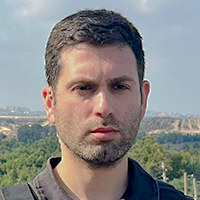Getting your Trinity Audio player ready...
Three Hezbollah operatives from the terrorist group’s elite Radwan Force were captured by IDF Golani Brigade soldiers in southern Lebanon, the army announced Tuesday evening.
Additionally, the military released footage from the interrogation of a Hezbollah terrorist, identified as Wadah Kamel Younis, who claimed that Hezbollah fighters fled following the assassination of their leader Hassan Nasrallah last month and that senior commanders in the sector had abandoned their posts early in the fighting. “Everyone [fled], the four (the commander of the area and his deputy), from the beginning, they already fled," he said.
Captured Hezbollah terrorist Wadah Younis: Radwan Force fled after Nasrallah’s assassination
(Video: IDF Spokesperson’s Unit)
Younis was the first Hezbollah fighter captured since Israel's ground operation began. According to the military, soldiers discovered an underground tunnel in a building used by Hezbollah terrorists.
After surrounding the site, Younis surrendered and was taken into custody for interrogation, where he described the Radwan Force as unmotivated and primarily interested in financial gain. “Lack of faith, people without religion, came to receive money and that’s it, they were afraid [of Israel]," he said.
He also said their plan to advance into Israel’s Galilee was scrapped after Nasrallah’s death. "[Radwan fighters] wanted to respond to the attack, advance to the Galilee, after the assassination of Hassan (Nasrallah), no one has seen any of them.”
Hezbollah terrorist Wadah Younis captured by IDF forces in southern Lebanon
(Video: IDF Spokesperson's Unit )
Three more Hezbollah fighters were later captured when Israeli forces uncovered another underground tunnel in the same area. The operatives, along with a large cache of weapons, surrendered after being surrounded.
All four captives are currently being held and interrogated by Israel's Unit 504, which specializes in intelligence gathering and field interrogations.
Unlike in the Gaza Strip, Unit 504’s intelligence network in Lebanon has been extensive and deeply established over the years. The use of agents in Lebanon has provided invaluable intelligence, playing a key role in the IDF’s recent operations across the country.
1 View gallery


Three of Hezbollah's Radwan Force fighters captured by IDF forces in southern Lebanon
(Photo: IDF Spokesperson's Unit)
Much like in Gaza, Unit 504 operatives are embedded directly with combat units, working alongside soldiers to guide them to targets and conduct field interrogations.
Captured terrorists are then transferred to specialized facilities, where professional interrogators focus on extracting critical information to aid ongoing military efforts.
Get the Ynetnews app on your smartphone:






